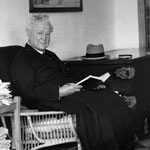This Day in History: August 10, 1940
Additional Date: August 10, 1940
Abe Bailey was born in Cradock, Cape Colony, in 1864. His father, a wagon maker and wool merchant, later moved with his family to Queenstown. When Bailey was only 7 years old, his mother passed away, and since he had a difficult relationship with his father, Bailey spent most of his time with Dutch friends who lived nearby.
He attended school in Yorkshire, England and after leaving school at the age of 15, Bailey worked in London for a cotton and wool trading firm. It was not long until he returned to South Africa, where he settled and worked as a stock broker and financial agent in Barberton.
By 1894, he had become the head of the Bailey Group of gold mines and was fast establishing himself as one of the main mining magnates on the Witwatersrand. Through his association with Cecil John Rhodes, he was able to acquire substantial property in the former Rhodesia (now Zimbabwe), and was therefore relatively wealthy by the age of 30.
Rhodes' influence on Bailey led to his involvement in the Jameson Raid, for which he had to pay a heavy fine. Bailey went on to participate in South African politics and upon Rhodes' death in 1902, served as his replacement in Parliament. In 1908, he represented Krugersdorp in the first Transvaal Parliamentary elections and was later known for his ability to facilitate negotiations between opposing political groups. Bailey was also active in British politics and was awarded with an order of honour for services rendered during World War One.
In 1929, Bailey was diagnosed with thrombosis, and both his legs were amputated by 1938. On 10 August 1940, he died and was buried in the hills of Muizenberg.
Sir Abe Bailey's South African legacy is demonstrated through the Abe Bailey Trust, which was created in accordance with his last will and testament. It also serves to award a travel bursary to individuals with exceptional leadership qualities, and numerous South Africans continue to benefit from this award.
